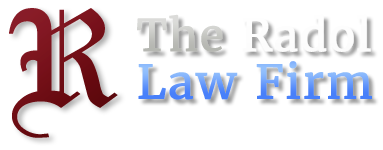Bergen County Chapter 7 Business Bankruptcy Attorney
If you are struggling to keep your business afloat, you needn’t face your creditors alone. At the Radol Law Firm, we understand that you have invested a lot of time, energy, and hard work in your business. But no matter how much work someone puts into a business, the business may not succeed. Before going through the process of bankruptcy, we will investigate all solutions to your business’s financial problems, including the possibility of a comprehensive workout of your debts or the alternative of Chapter 11, a reorganization plan. Sometimes, the only option is to liquidate the business’s assets in hopes of starting anew. If you need legal guidance through the process of Chapter 7 business bankruptcy, contact The Radol Law Firm to discuss your options and get back on track.
Understanding When Chapter 7 Business Bankruptcy Is a Good Choice
In a Chapter 7 business bankruptcy, your business will be liquidated to partially repay your creditors. When successful, you will be able to walk away from the remaining debt. If you have personally signed or guaranteed business debt, this can also be addressed with the right representation. Chapter 7 bankruptcy may be appropriate if your business cannot continue operations because of high debt or operating expenses and the lack of operating capital and significant assets.
Chapter 7 bankruptcy is likely the best option if your business:
- Has little or no potential to make money.
- Offers a product or service that is easily reproducible.
- Has debts or significant accounts payable making debt restructuring impossible.
If you believe that your business can recover through the restructuring of debts, then Chapter 11 business bankruptcy may be available to you.
How Chapter 7 bankruptcy works
Chapter 7 starts with filing a petition with the bankruptcy court serving your area. With that petition, a business owner must file documents detailing assets and liabilities, current income and expenditures, executory contracts and unexpired leases, and a financial statement. In addition, the petitioner must provide the trustee with the latest tax return or the transcripts for the most recent tax year and prior tax returns that span the time of the case and possibly further. This process goes much further and deserves the attention of an experienced legal team to prepare you for the process.
After a business owner successfully files for bankruptcy, an “automatic stay” will go into effect, stopping most creditors from pursuing the debt until further action is taken by actors of the bankruptcy court.
After a few weeks, a trustee will hold a meeting of creditors. During the meeting, the debtor, under oath, will answer the questions of the trustee and any creditors that attend. These questions are regarding the debtor’s financial affairs and property. After a few days, the trustee will share their assessment with the court. This could include the possibility of a conversion to another chapter or ineligibility under the Bankruptcy Code.
If successful, a business will be issued a Chapter 7 discharge, allowing the release of debtors unsecured debts. Above is a simplification of a complex, document-heavy process. If you are facing Chapter 7 business bankruptcy, consult with an attorney.
Contact Our Firm
The Radol Law Firm has over 30 years of experience guiding businesses through the process of bankruptcy. Our firm carefully counsels business clients to ensure that Chapter 7 or Chapter 11 bankruptcy is truly the best option. Depending on your circumstances, we may be able to help you avoid business bankruptcy by creating a debt restructuring strategy. To schedule a consultation with a New Jersey Chapter 7 Business Bankruptcy Attorney, contact The Radol Law Firm.
